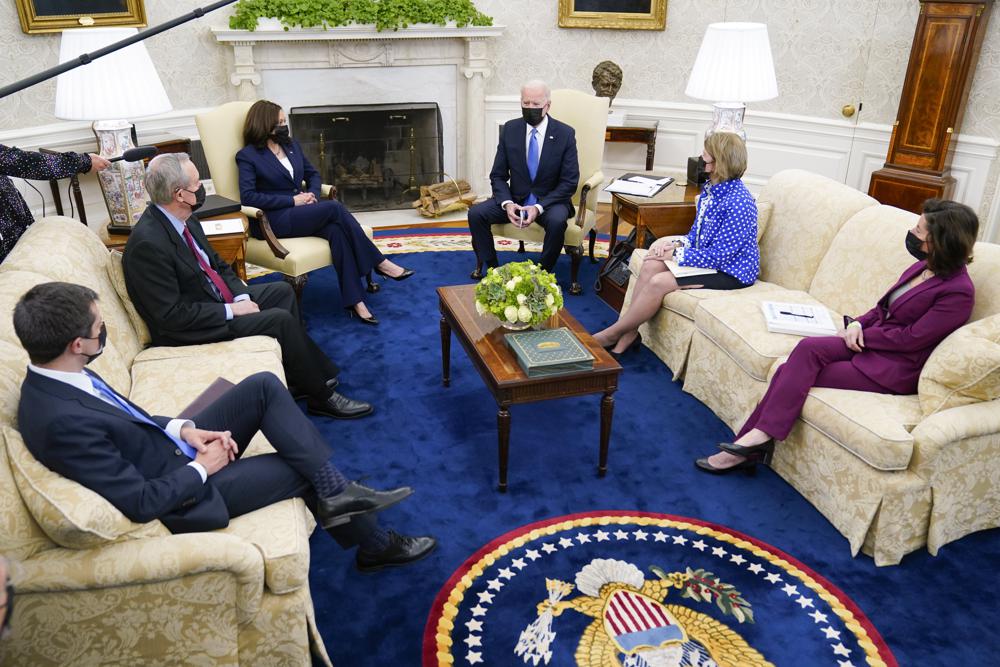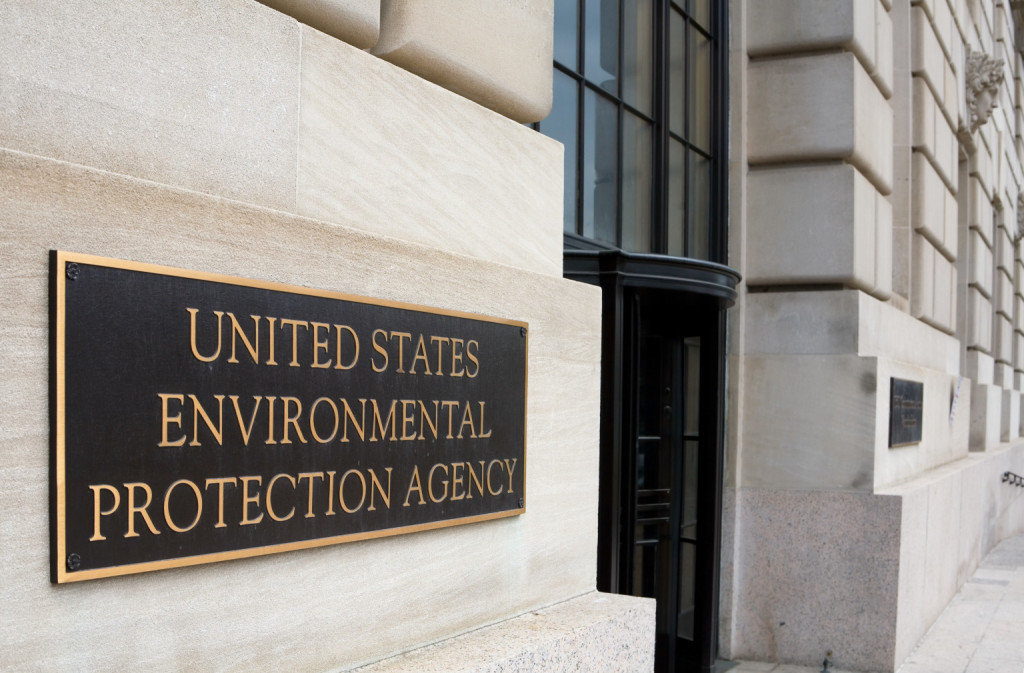Joe Biden, GOP senators upbeat, plan more infrastructure talks

After meeting at the White House, President Joe Biden and a group of Republican senators agreed to talk again early next week as negotiations intensified Thursday over a potentially bipartisan infrastructure package that could become one piece of the administration’s ambitious $4 trillion public investment plan. The GOP senators exited the more than 90-minute meeting “encouraged” about their discussions with the president and prepared to build on the $568 billion proposal they had put forward last month as an alternative to his sweeping American jobs and families plans. “The president asked us to come back and rework an offer so that he could then react to that,” said Sen. Shelley Moore Capito of West Virginia, who is leading the group. “We’re very encouraged,” she told reporters outside the White House. “The attitude the president had in the Oval Office with us was very supportive and desirous of striking a deal.” Biden also emerged upbeat. “I am very optimistic that we can reach a reasonable agreement — and even if we don’t it’s been a good-faith effort,” Biden said in the Rose Garden. Biden is intent on at least trying to strike a deal with Republicans rather than simply going it alone with a Democrats-only bill, which might in some ways be a more politically viable route in a Congress held by the president’s party with only the slimmest of majorities. One strategy that appears to be coming into focus would be for Biden to negotiate a more limited, traditional infrastructure bill of roads, highways, bridges, and broadband as a bipartisan effort. Then, Democrats could try to muscle through the remainder of Biden’s priorities on climate investments and the so-called human infrastructure of child care, education, and hospitals on their own. “I’m willing to negotiate,” Biden said earlier at the White House. But the president has indicated that he’s not about to wait indefinitely for a compromise that may or may not come, and reiterated his view Thursday that “doing nothing is not an option.” The White House said the president stressed that inaction was a “red line for him.” He set a Memorial Day deadline for progress on a bipartisan deal. Those gathered included some of the top-ranking Republicans — Sens. John Barrasso of Wyoming, Roy Blunt of Missouri, Mike Crapo of Idaho, Pat Toomey of Pennsylvania, and Roger Wicker of Mississippi. Joining Biden were Vice President Kamala Harris, Transportation Secretary Pete Buttigieg, and Commerce Secretary Gina Raimondo. Thursday’s meeting followed a lengthy session at the White House with the congressional leadership the day before. Republican leader Mitch McConnell has said his side will accept spending as much as $800 billion, but Republicans made it clear they would refuse to embrace Biden’s broad proposals or his idea of raising taxes on corporations and the wealthy to pay for the plans. The White House outreach is part political strategy, part practical legislating. Striking a deal with Republicans would give all sides a political win — a rare bipartisan accomplishment — without fully forfeiting the president’s broader goals, which are largely shared by Democrats. It also acknowledges the “red line” that McConnell has drawn agaiTfnst GOP votes for undoing the 2017 tax law by raising taxes on corporations or those earning more than $400,000. “I want to get a bipartisan deal on as much as we can get a bipartisan deal on — and that means roads, bridges, broadband, all infrastructure,” Biden said Wednesday on MSNBC. “And then fight over what’s left and see if I can get it done without Republicans if need be.” Capito has taken the lead for Senate Republicans, keeping in close contact with both the president’s team and McConnell, she said, as she shuttles between the White House and Capitol Hill. The West Virginia senator is no stranger to the legislative process, serving more than a decade in the House and now as the ranking Republican on the Senate Energy and Public Works Committee. She ushered a $35 billion bipartisan water resources bill to passage in the Senate and is hard at work with the panel’s Democratic chairman, Tom Carper of Delaware, a Biden ally, on a big surface transportation bill. Biden personally reached out to Capito late last week after the water bill cleared the Senate. “The president he expressed on the phone with me, and has with others, that you know he’s anxious to move forward,” she said. “His desire is to define where we have common ground and I think we’ll probably spend the bulk of the time talking about that.” Biden has insisted he doesn’t want working-class Americans to bear the “burden” of paying for all the new infrastructure investments alone, resisting GOP plans for taxes and user fees, like tolls, to fund the projects. One potential new funding source could be the more than $1 trillion in unpaid taxes each year. House Speaker Nancy Pelosi has mentioned tapping that potential funding source and she said Biden discussed it at their meeting Wednesday. Republicans have not resisted it. “That’s a big chunk that would go a long way,” she said Thursday. McConnell and House Republican leader Kevin McCarthy have insisted they want the infrastructure bills to go through the committee process, where lawmakers can hammer out the details and take ownership of the proposals, rather than have the package negotiated in their leadership suites. Republished with the permission of the Associated Press.
EPA rethinking air pollution rule for power plants

The Trump administration is considering rewriting another Obama-era rule controlling hazardous emissions from coal-fired power plants, this one on mercury and other pollutants. Environmental Protection Agency spokeswoman Molly Block said Wednesday that the agency is still preparing its proposal for consideration by the White House’s Office of Management and Budget and that there are few details to release. The EPA is looking at whether the 2012 rule on power plant emissions was necessary, among other issues, Block said. The Obama administration rule set limits for emissions of mercury, arsenic and other toxic air pollutants from coal- and oil-fired power plants. The U.S. Energy Information Administration said last year that almost all the country’s coal-fired power plants were now in compliance with the 2012 rule. Democratic Sen. Tom Carper of Delaware and Republican Sen. Lamar Alexander of Tennessee urged the EPA in a joint letter to keep the 2012 limits in place, saying the rules has cut mercury emissions from power plants by 90 percent. The EPA announced earlier this month that it was moving to relax federal oversight of emissions from coal-fired power plants under a separate Obama-era rule from 2015. Republished with the permission of the Associated Press.
Senate Democrats block action on president’s trade agenda
Senate Democrats dealt President Barack Obama a stinging setback on trade Tuesday, blocking efforts to begin a full-blown debate on his initiatives. The president’s supporters said they will try again, possibly starting in the House. But they were unable to sugar-coat a solid rebuke of a major Obama priority by members of his own party, some of whom served with him in the Senate. Only one Senate Democrat, Tom Carper of Delaware, voted for a GOP-crafted motion to start considering Obama’s request for “fast track” trade authority. Fast track would let the president present trade agreements that Congress could ratify or reject, but not amend. Proponents needed 60 votes to thwart a Democratic filibuster, but managed only 52 in the 100-member Senate. Tuesday’s vote highlighted the deep divide between Obama and the many congressional Democrats who say trade deals hurt U.S. jobs. Leading the fight against fast track are labor unions and liberal groups, which are crucial to many Democrats’ elections. Most Republican lawmakers support free-trade agreements. They were in the strange position Tuesday of losing a vote but seeing the Democratic president take the blame. “It is the president’s party,” said GOP Sen. Orrin Hatch of Utah. “It’s amazing to me that they would do this to the president on a bill of this magnitude.” Senate Majority Leader Mitch McConnell of Kentucky called the results “pretty shocking.” But Democratic Sen. Bill Nelson of Florida said, “Maybe what McConnell really wants to do is embarrass the president.” Several Democrats said Obama erred by pointedly criticizing a leading Democratic foe on trade, Sen. Elizabeth Warren of Massachusetts, in an interview with Yahoo News. Those Democrats said they bristled when Obama suggested Warren was poorly informed and politically motivated. Democratic senators said they also are tired of seeing the Democratic president cozy up to Republicans on trade. Most Republican lawmakers support trade agreements. But Obama must recruit a fair number of House and Senate Democrats to achieve his trade goals. Several Democrats say they will back fast track only if Republican leaders clear a path for three other trade measures. One, to renew the African Growth and Opportunity Act, is uncontroversial. The second calls for Trade Adjustment Assistance, which provides federal aid to workers displaced by trade agreements. Republicans don’t like it, but reluctantly acknowledge it’s the price for winning even modest Democratic support. The third bill, involving Customs enforcement, is the stickiest. It includes a measure to take actions against countries that keep their currency artificially low, which makes their exports more attractive. The Obama administration opposes the “currency manipulation” measure, saying it could invite international challenges to the Federal Reserve’s policies meant to boost the U.S. economy. McConnell said that only two of the bills — fast track and Trade Adjustment Assistance — would be the subject of initial votes, but senators would have ample chances to address the other two bills during the amendment process. Democrats met at midday and declared McConnell’s package unacceptable. Republished with permission of The Associated Press.


